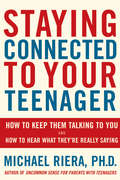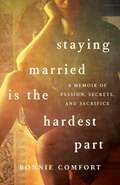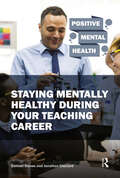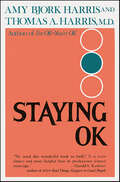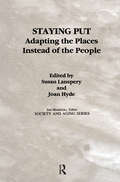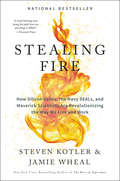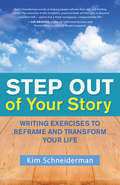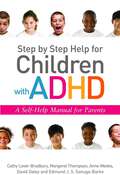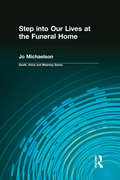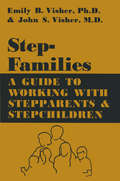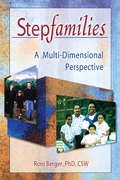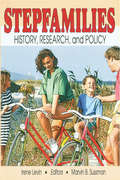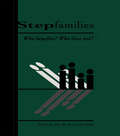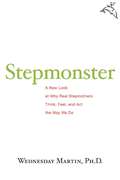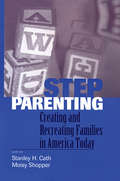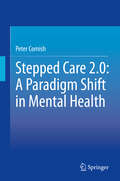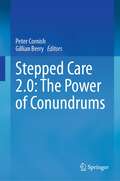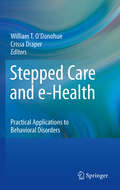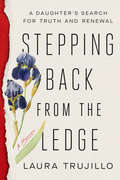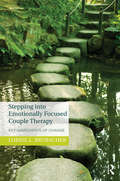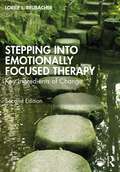- Table View
- List View
Staying Connected To Your Teenager
by Michael RieraAt last, a book of sage advice that will help frustrated parents reconnect with their teenager and keep that connection even in today's often-crazy world.The first step is simple: realizing that inside every teen resides two very different people-the regressed child and the emergent adult. The emergent adult is seen at school, on the playing field, in his first job, and in front of his friends' families. Unfortunately, his parents usually see only the regressed child-moody and defiant-and, if they're not on the lookout, they'll miss seeing the more agreeable, increasingly adult thinker in their midst.With ingenious strategies for coaxing the more attractive of the two teen personalities into the home, family psychologist Mike Riera gives new hope to beleaguered and harried parents. From moving from a "managing" to a "consulting" role in a teen's life, from working with a teen's uniquely exasperating sleep rhythms to having real conversations when only monosyllables have been previously possible, Staying Connected to Your Teenager demonstrates ways to bring out the best in a teen-and, consequently, in an entire family.
Staying Connected to Your Teenager: How to Keep Them Talking to You and How to Hear What they're Really Saying
by Michael RieraAt last, a book of sage advice that will help frustrated parents reconnect with their teenager and keep that connection even in today's often-crazy world. The first step is simple: realizing that inside every teen resides two very different people-the regressed child and the emergent adult. The emergent adult is seen at school, on the playing field, in his first job, and in front of his friends' families. Unfortunately, his parents usually see only the regressed child-moody and defiant-and, if they're not on the lookout, they'll miss seeing the more agreeable, increasingly adult thinker in their midst. With ingenious strategies for coaxing the more attractive of the two teen personalities into the home, family psychologist Mike Riera gives new hope to beleaguered and harried parents. From moving from a "managing" to a "consulting" role in a teen's life, from working with a teen's uniquely exasperating sleep rhythms to having real conversations when only monosyllables have been previously possible, Staying Connected to Your Teenager demonstrates ways to bring out the best in a teen-and, consequently, in an entire family.
Staying Married is the Hardest Part: A Memoir of Passion, Secrets, and Sacrifice
by Bonnie ComfortFor fans of Lori Gottlieb&’s Maybe You Should Talk to Someone, a contemporary memoir by a psychologist whose sexual conflict with her screenwriter husband threatens to destroy her marriage.Can a loving relationship endure career setbacks, infidelities, and mismatched sexual desires? This is the question psychologist Bonnie Comfort grapples with as she navigates her unpredictable thirty-year marriage to Hollywood screenwriter Bob, while she provides marital therapy to others. Bob is affectionate, brilliant, and hilarious—but his sexual desires are incompatible with Bonnie's. Despite her misgivings, she indulges his kinks, which often include photographing her in lingerie. Their Hollywood life is exciting, but eventually Bob's growing career frustrations lead to his complete sexual shutdown. Tensions rise, and Bob suggests Bonnie have discreet affairs and not tell him. She does just that—but when she confesses her infidelities five years later, his sexual demands become more extreme. When she complies, Bonnie feels shame; when she refuses, as she increasingly does, their fights threaten to tear their marriage apart. Bonnie understands the rhythm of disconnection and repair that is common in love relationships. With honesty and vulnerability, she recounts the highs and lows of her own marriage which sadly ends with Bob's death. As she grieves, Bonnie reflects on her role in their marital struggles and offers profound insights from personal and professional experience. Her story lays bare the complexities of love, the ongoing challenges women face in intimate relationships, and how even difficult marriages can find a way to thrive.
Staying Mentally Healthy During Your Teaching Career (Positive Mental Health)
by Jonathan Glazzard Samuel StonesThe mental health of teachers in school is just as important as the well-being of the pupils they support. Recent research reveals some alarming statistics, including that 74% of teachers are unable to relax and have a poor work-life balance. This book examines a range of relevant issues including workload, managing behaviour, developing resilience and managing professional relationships in order to address some of these concerns and provide comprehensive guidance and workable, evidence-informed strategies to support all those teaching in schools and colleges.
Staying OK: How to Maximize Good Feelings and Minimize Bad Ones
by Thomas A. Harris Amy HarrisA sequel to I'm OK—You're OK. This book offers advice on making important changes and taking charge of your life, resolving conflicts, and rooting out the causes of worry, panic, depression, regret, confusion and feelings of inadequacy.
Staying Put: Adapting the Places Instead of the People (Society and Aging Series)
by Susan Lanspery Joan HydeMost existing housing offers a poor fit for older people and people with disabilities, and new construction adds less than 2 per cent to the housing each year. Ninety-nine percent of the housing that will be in use in the year 2000 exists today. The long-needed anthology "Staying Put: Adapting the Places Instead of the People" emphasizes the disabilities and abilities of environments instead of individuals. With contributions from leading authorities, it integrates a wide range of theoretical and practical ideas about housing adaptation for researchers, students, consumers, policymakers, and practitioners in human services and the building trades.
Staying Sober: A Guide for Relapse Prevention
by Terence T. Gorski Merlene MillerThis Relapse Prevention Model accepted by many rehab facilities and is a definite read for those who struggle with addictions.
Stealing Fire: How Silicon Valley, the Navy SEALs, and Maverick Scientists Are Revolutionizing the Way We Live and Work
by Steven Kotler Jamie WhealIt’s the biggest revolution you’ve never heard of, and it’s hiding in plain sight. Over the past decade, Silicon Valley executives like Eric Schmidt and Elon Musk, Special Operators like the Navy SEALs and the Green Berets, and maverick scientists like Sasha Shulgin and Amy Cuddy have turned everything we thought we knew about high performance upside down. Instead of grit, better habits, or 10,000 hours, these trailblazers have found a surprising short cut. They're harnessing rare and controversial states of consciousness to solve critical challenges and outperform the competition. New York Times bestselling author Steven Kotler and high performance expert Jamie Wheal spent four years investigating the leading edges of this revolution—from the home of SEAL Team Six to the Googleplex, the Burning Man festival, Richard Branson’s Necker Island, Red Bull’s training center, Nike’s innovation team, and the United Nations’ Headquarters. And what they learned was stunning: In their own ways, with differing languages, techniques, and applications, every one of these groups has been quietly seeking the same thing: the boost in information and inspiration that altered states provide. Today, this revolution is spreading to the mainstream, fueling a trillion dollar underground economy and forcing us to rethink how we can all lead richer, more productive, more satisfying lives. Driven by four accelerating forces—psychology, neurobiology, technology and pharmacology—we are gaining access to and insights about some of the most contested and misunderstood terrain in history. Stealing Fire is a provocative examination of what’s actually possible; a guidebook for anyone who wants to radically upgrade their life.
Stem Cell Production: Processes, Practices and Regulations
by Firdos Alam KhanThis book examines the technologies and processes for the development and commercial production of stem cells according to cGMP guidelines. The initial chapter of the book discusses the therapeutic potentials of stem cells for the treatment of various diseases, including degenerative disorders and genetic diseases. The book then reviews the recent developments in the cultivation of stem cells in bioreactors, including critical cultural parameters, possible bioreactor configuration and integrations of novel technologies in bioprocess developmental stages. The book also introduces microscopic, molecular, and cellular techniques for characterization of stem cells for regulatory approvals. Further, it describes optimal cell transporting conditions to maintain cell viability and properties. Further, it summarizes characterization strategies of clinical grade stem cells for stem cell therapy. This book is an invaluable contribution to having an academic and industrial understanding with respect to R&D and manufacturing of clinical grade stem cells.
Stem cells: From Potential to Promise
by Khawaja Husnain HaiderThe book highlights the therapeutic applications of various stem cells, and introduces readers to thymus stem cells and their applications in the reconstitution of thymic structure and function. It also discusses the significant role of mesenchymal stem cells (MSCs) in the treatment of autoimmune diseases and the use of MSC-derived exosomes in cell-free therapy. Moreover, it explores the application of hematopoietic stem cells in the vasculoprotection of the ischemially injured heart. Further topics include the regenerative potential of ovarian germline stem cells and the significance of endometrial stem cells in the pathogenesis of female reproductive tract diseases. Lastly, the book addresses stem cells from perinatal tissues and their immunoregulatory and differentiation potentials, and summarizes new strategies for targeting cancer stem cells to treat tumors.
Step Out of Your Story: Writing Exercises to Reframe and Transform Your Life
by Kim SchneidermanREFRAME YOUR STORY, RECLAIM YOUR LIFE Every day we relate stories about our highs and lows, relationships and jobs, heartaches and joys. But do we ever consider the choices we make about how to tell our story? In this groundbreaking book, Kim Schneiderman shows us that by choosing a version that values life lessons and meaningful personal victories we can redirect our energy and narrative toward our desires and goals. It presents character development workouts and life-affirming, liberating exercises for retelling our stories to find redemptive silver linings and reshape our lives. As both a therapist and a writer, Schneiderman knows the power of story. By employing the storytelling techniques she offers, you’ll learn to view your life as a work in progress and understand big-picture story lines in ways that allow you to easily steer your actions and relationships toward redefined — and realistic — “happy endings.”
Step by Step Help for Children with ADHD: A Self-Help Manual for Parents
by David Daley Cathy Laver-Bradbury Margaret Thompson Anne Weeks E Sonuga-BarkeRaising a child with ADHD can be distressing and exhausting for the whole family. But given the appropriate knowledge, and the right tools, parents can intervene to manage their child's behaviour, leading to improved relationships at home and, it is hoped, a more successful time at school. This simple, flexible six-step programme is full of tried-and-tested ideas for parents and professionals supporting families of young children with ADHD. By practicing the techniques and strategies, parents will gain confidence in their parenting and, over time, will improve the child’s management of the condition. The programme includes games that will help improve the child’s attention, exercises to develop patience and tips for supporting the child in successful self-organization. There are also plenty of useful ideas for developing communication between parents and schools. Based on research and extensive clinical experience, Step by Step Help for Children with ADHD will help families to adapt their parenting to the child, improving relationships and behaviours in the home and at play group.
Step into Our Lives at the Funeral Home (Death, Value and Meaning Series)
by Dale A Lund Jo MichaelsonMany people are curious about what goes on behind the scenes at a funeral home. Add a live-in family to this scenario, and you'll Step Into Our Lives at the Funeral Home. Shh! Be quiet! There's someone at the door! Don't ever talk about anything you have seen or heard concerning someone's death outside the walls of our home. Mourning families need to know they can trust our integrity and our ability to keep confidentiality. For the author's family, these admonitions were ingrained in the children's minds at an early age. This book gives an insightful view of every facet of the funeral, from the time a death call is received until the funeral is completed. Stories of days in the ambulance business in conjunction with the funeral home are also related. The funeral director's role, the spouse's role, the children's role, and how the children thrived in an atmosphere of death are shared with the reader. How funeral directors cope with stress and how wives cope with their husbands during these times are revealed. Years later, following a tragic death, three people look back and share their stories of moving from despair to recovery. Interspersed through every chapter are stories and vignettes shared by many funeral directors throughout the Midwest, concerning the lifestyle for the family living in the funeral home and true incidents of specific funerals. Some stories are sad. Others are tragic. A few are humorous. Embracing faith, hope, and love is a primary requisite for healing. Intended audience: General readers of all ages, funeral home directors, hospice patients, mortuary students, and people who have had a loved one die by natural means or tragedy.
Stepfamilies: A Guide To Working With Stepparents And Stepchildren
by Emily B. VisherStudies the differences between stepfamilies and nuclear families, and the adjustments and stresses families face as a result of remarriage. Demonstrates numerous therapeutic models with techniques which may be used in individual or group therapy Special attention given to the problems of children in stepfamilies.
Stepfamilies: A Multi-Dimensional Perspective
by Roni BergerCombining theoretical, empirical, and clinical knowledge, Stepfamilies: A Multi-Dimensional Perspective contains recent research and information that will help mental health practitioners, family therapists, psychologists, and counselors understand the characteristics, dynamics, needs, and issues of nonclinical stepfamilies. Based on direct experiences with diverse types of stepfamilies, this book gives you new guidelines and strategies that will enable you to offer more successful sessions to your clients and improve your effectiveness as a practitioner. Developed to give you a more realistic understanding of stepfamilies, this text helps you avoid the stereotypes and false perceptions that often surround stepfamilies. Offering methods and strategies aimed at making your clients feel comfortable about themselves and their situations, Stepfamilies: A Multi-Dimensional Perspective examines several aspects of these families that you need to know in order to improve your effectiveness with them, including: the definition and description of stepfamilies and recognizing historical and social changes in the stepfamily structure critical reviews on the present knowledge of stepfamilies describing the complexity of family structure, the ambiguity of boundaries and roles, and the struggle with the diverse phases of the life cycle discussing key issues for stepfamilies, such as past orientation and acceptance/rejection of differences from non-stepfamilies and focal subsystems the profile, characteristics, and case studies of an innovative typology of stepfamilies that includes integrated families, invented families, and imported families aspects of ethnically and culturally different stepfamilies, including American stepfamilies, Israeli stepfamilies, and immigrant stepfamilies from the former Soviet Union social perceptions and attitudes of stepfamilies in schools, social services, community organizations, the media, and with the lawOffering case studies and data on a variety of families and situations, Stepfamilies: A Multi-Dimensional Perspective will show you that all stepfamilies are not the same and cannot be helped by just one practice method. Complete with principles and instruments to assess patients and the success of sessions, Stepfamilies: A Multi-Dimensional Perspective works to promote an understanding of stepfamilies that will result in effective and positive therapy for your clients.
Stepfamilies: History, Research, and Policy
by Marvin B SussmanStepfamilies: History, Research, and Policy examines language use, laws, cultural stereotypes, media images, and social policies and practices to create an understanding of how predominant views about stepfamilies and stepfamily members are constructed within society. As the rates of divorce and remarriage continue to increase, it is more important than ever to overcome nuclear family ideology and abandon the model of research that compares stepfamilies with nonstepfamilies. This book shows you how honor and empowerment can be attained in new family structures and how alternative kin networks can be just as healthy as the traditional nuclear family unit.As this book examines the ability of different societies to integrate different family forms into mainstream notions of “family,” you will realize the damaging effects of treating stepfamilies as incomplete, undesirable institutions. In fact, Stepfamilies: History, Research, and Policy will challenge your notions of family over and over again, as it discusses: key relationships in stepfamilies stepfather involvement in parenting after remarriage meaning of gender in a stepfamily differences in “investment” between biological and nonbiological parents demographic change and significant shifts in the social and cultural implications of stepfamilies attempting to reconstruct a household like that of a previous marriage the impact of stereotypes on the internal dynamics of stepfamilies and on the interactions of stepfamilies with outsiders the absence of guidelines and cultural norms for role performance and problem solving in stepfamiliesStepfamilies: History, Research, and Policy discusses both the difficulties of forming new families and households as well as the factors that promote family cohesiveness and integration in stepfamilies. From stereotypes of stepmothers to ambiguous legal relationships to child maltreatment in stepfamilies to sibling relations, there isn’t much that the penetrating lens of this book leaves uncovered.
Stepfamilies: Who Benefits? Who Does Not? (Penn State University Family Issues Symposia Series)
by Alan Booth Judy DunnStepfamilies represent an increasing number of American households and shape the upbringing of countless stepchildren. Despite their prominence in society, our knowledge about these families is very limited. To address this deficit, the editors have drawn together the work of 16 nationally known scholars to deal with four questions: * Marriages that create stepfamilies: Why do they occur? Fail? Succeed? * How do stepfamilies function as child rearing environments? * How do stepfamilies function as sources of support in later life? * Building research and policy agendas: What is needed? In seeking answers to these questions, the book bridges the disciplines of psychology, sociology, social psychology, child development, demography, law and policy. Readers will gain an understanding of the current knowledge about stepfamilies, obtain an appreciation of the diverse views on a variety of stepfamily issues, learn about existing and anticipated laws and policies that affect stepfamilies, and acquire ideas on needed research and policy agendas. Chapter authors are leading figures in psychology, sociology, demography, human development, and family law; their contributions are valuable to researchers, teachers, and students as well as policymakers and legislatures.
Stepmonster: A New Look at Why Real Stepmothers Think, Feel, and Act the Way We Do
by Wednesday MartinAn honest and groundbreaking guide to understanding the complicated emotions that develop between stepmothers and children. When faced with often overwhelming challenges, what woman with stepchildren is unfamiliar with that "stepmonster" feeling? Half of all women in the United States will live with or marry a man with children. To guide women new to this role--and empower those who are struggling with it--Wednesday Martin draws upon her own experience as a stepmother. She's frank about the harrowing process of becoming a stepmother, she considers the myths and realities of being married to a man with children, and she counteracts the cultural notion that stepmothers are solely responsible for the problems that often develop. Along the way, she interviews other stepmothers and stepchildren and offers up fascinating insights from literature, anthropology, psychology, and evolutionary biology that explain the little-understood realities of this unique parent-child relationship and--in an unexpected twist--shows why the myth of the Wicked Stepmother is the single best tool for understanding who real stepmothers are and how they feel.
Stepparenting: Creating and Recreating Families in America Today
by Stanley H. Cath Moisy ShopperIn an era when teachers commonly report that up to half of the children in their classes come from multiple homes and have multiple caretakers, the special psychological challenges of stepparenting have never been in greater need of examination. As thoughtful clinicians have long known, stepparenting is among the most complicated of psychological projects: it may simultaneously be a multifaceted burden and a spur to personal autonomy, deepened sensitivity to others, and newfound competence as a nurturer. Among the thousands of divorced people who remarry each year, most - despite their best resolve to live in the present - persist in reassessing the price of separation, especially as they come to appreciate the fact that divorce is seldom a total break for their children. Stepparenting is a comprehensive exploration of the process of reconstructing families. More specifically, it is a book about the perils and promise of stepparenting, a caretaking role that may be more challenging than biologically given child rearing. Contributors follow people as they try to reevaluate past misunderstandings and acclimate to new parenting contexts and obligations. Editors Cath and Shopper have taken pains to offer a balanced purview that includes both successful and maladaptive instances of stepparenting. Of special note are the clincal examples throughout the book that chart the extended periods of slow, creative learning experienced by parents and children, biological and step, as they test the waters of new family systems and try to elicit newly attuned responses from each other.
Stepped Care 2.0: A Paradigm Shift in Mental Health
by Peter CornishThis book is a primer on Stepped Care 2.0. It is the first book in a series of three. This primer addresses the increased demand for mental health care by supporting stakeholders (help-seekers, providers, and policy-makers) to collaborate in enhancing care outcomes through work that is both more meaningful and sustainable. Our current mental health system is organized to offer highly intensive psychiatric and psychological care. While undoubtedly effective, demand far exceeds the supply for such specialized programming. Many people seeking to improve their mental health do not need psychiatric medication or sophisticated psychotherapy. A typical help seeker needs basic support. For knee pain, a nurse or physician might first recommend icing and resting the knee, working to achieve a healthy weight, and introducing low impact exercise before considering specialist care. Unfortunately, there is no parallel continuum of care for mental health and wellness. As a result, a person seeking the most basic support must line up and wait for the specialist along with those who may have very severe and/or complex needs. Why are there no lower intensity options? One reason is fear and stigma. A thorough assessment by a specialist is considered best practice. After all, what if we miss signs of suicide or potential harm to others? A reasonable question on the surface; however, the premise is flawed. First, the risk of suicide, or threat to others, for those already seeking care, is low. Second, our technical capacity to predict on these threats is virtually nil. Finally, assessment in our current culture of fear tends to focus more on the identification of deficits (as opposed to functional capacities), leading to over-prescription of expensive remedies and lost opportunities for autonomy and self-management. Despite little evidence linking assessment to treatment outcomes, and no evidence supporting our capacity to detect risk for harm, we persist with lengthy intake assessments and automatic specialist referrals that delay care. Before providers and policy makers can feel comfortable letting go of risk assessment, however, they need to understand the forces underlying the risk paradigm that dominates our society and restricts creative solutions for supporting those in need.
Stepped Care 2.0: The Power of Conundrums
by Peter Cornish Gillian BerryStepped Care 2.0: A Paradigm Shift in Mental Health, by Dr Peter Cornish, made a compelling argument for why the existing mental health care system has consistently struggled to meet the needs of clients from all walks of life, and laid out key principles and guidelines for how the system could be changed. But what challenges are involved in putting these ideas into practice? Stepped Care 2.0: The Power of Conundrums features essays, interviews, and arguments from a wide range of contributors who have tried to do just that. The Power of Conundrums dives deep into the practical application of the Stepped Care 2.0 model (SC2.0), looking at the ways SC2.0 has succeeded, the difficulties administrators face when implementing it, and how it could be improved. Chapters touch on topics including: the evidence for stepped care, the way SC2.0 can be stymied by the Western cultural values that dominate mental healthcare, implementation science and SC2.0, the risk paradigm and SC2.0, the model’s one-at-a-time approach to therapy, what co-design means in an SC2.0 context, a case study on how implementing SC2.0 can go wrong, the understanding of recovery put forward by the model, and how SC2.0 can work for clients experiencing complex, persistent, or chronic mental health issues. Each chapter is followed by a reflection from Cornish, and the book concludes with a roundtable discussion about how SC2.0 can evolve to meet the challenges it faces. This text brings theory and practice together by including an updated version of Stepped Care 2.0: A Paradigm Shift in Mental Health, as well as the full text of Stepped Care 2.0: The Power of Conundrums.
Stepped Care and e-Health
by William O'Donohue Crissa DraperStepped care provides the least intrusive intervention to individuals seeking treatment by providing a range of treatment intensities. In the past two decades, computers and the internet have provided a new and efficient medium that lends well to adding steps in a stepped-care model. While there is ample evidence to support the positive effects of bibliotherapy or self-help books, computer-aided therapy (also known as e-health) has the potential to take these effects even further. This volume will be of interest to practitioners and organizations attempting to serve rural and underserved communities. The book focuses on evidence-based treatment, making it consistent with quality improvement initiatives.
Stepping Back from the Ledge: A Daughter's Search for Truth and Renewal
by Laura TrujilloIn this stunning memoir of grief and survival, one woman confronts her family&’s secrets in the aftermath of her mother&’s suicide, asking a seemingly impossible question: How do you mourn a loved one as you repair the injuries they inflicted?&“Laura Trujillo resurfaces from the dark &‘sub-basement&’ of despair with assurances for us all: There is hope. There is healing. Always, there is love. This book will save lives.&”—Connie Schultz, author of The Daughters of ErietownLaura Trujillo had been close to her mother for most of her adult life, raising her four children within a few miles of their beloved grandmother&’s Phoenix home. But just three months after moving her young family to Cincinnati for a new job, Laura receives shocking news: Her mother had taken her own life—by jumping off a ledge into the Grand Canyon, a place Laura knew her mother had always loved. Laura and her mother had shared a profound and special bond, yet each had also kept from the other the deepest truths about their lives. As an adult, Laura finally broke her silence about the sexual abuse she had suffered as a teenager at the hands of her stepfather—a secret Laura had buried to protect her mother. After her mother&’s death, Laura embarks on an emotional odyssey, searching for clues that could explain the depression, intergenerational trauma, and shared heartbreaks in her family. When she returns to the Grand Canyon, it becomes an oasis that nurtures Laura&’s search for redemption and peace. As Laura wrestles with her feelings, she forges a new path forward. Moving and intimate, powerfully told, Stepping Back from the Ledge is a remarkable exploration of the bond between a mother and daughter, and of the hope that can come from facing the truth.
Stepping into Emotionally Focused Couple Therapy: Key Ingredients of Change
by Lorrie L. BrubacherThis volume makes Emotionally Focused Couple Therapy (EFT) widely accessible to therapists of different orientations and to therapists in training. It provides clinicians with practical tools, an experiential tour through case examples, and simple guidance to step into EFT. An overview of the change events includes both client processes and therapist interventions moment-to-moment. 'In Stepping into Emotionally Focused Couple Therapy: Key Ingredients of Change, each step and stage of EFT is laid out in a practical and theoretically simple manner that extends beyond what therapists need to do, to helping therapists grasp what experiential therapy is, providing moment-by-moment examples of how to engage clients emotionally, and how to foster emotional engagement between partners.'- From the Foreword by S. Johnson and A. Lee
Stepping into Emotionally Focused Therapy: Key Ingredients of Change
by Lorrie L. BrubacherThis accessible, practical, and thoroughly updated second edition introduces and presents how emotionally focused therapy can be used effectively across all three modalities, couple, family, and individual therapy, with clients from a diversity of backgrounds.Responding to critical updates in the field, this second edition once again follows Emily, an EFT therapist, to demonstrate how EFT can be used in practice. With updated references, research, and terminology throughout, this new edition reflects recent theoretical and practical updates by refocusing the model toward therapist interventions, such as the "EFT Tango," rather than the client change events, making it more accessible for readers to learn. It addresses the current need to integrate explicit socio-cultural sensitivity into EFT by including diverse case studies, explicit discussion of how the model can be applied with a diversity of clients, and how EFT therapists can integrate cultural sensitivity and attunement across multiple and diverse identities, such as race, gender, sexual orientation, disabilities, neurotypicality, class, and religion. It can also be used alongside a practical new workbook, Workouts for Stepping into Emotionally Focused Therapy, providing therapists with all the tools needed to confidently integrate this approach into their practice.This book is an essential read for all marriage and family therapists in practice and in training as well as counselors who are looking to use EFT with couples, families, and individuals.
